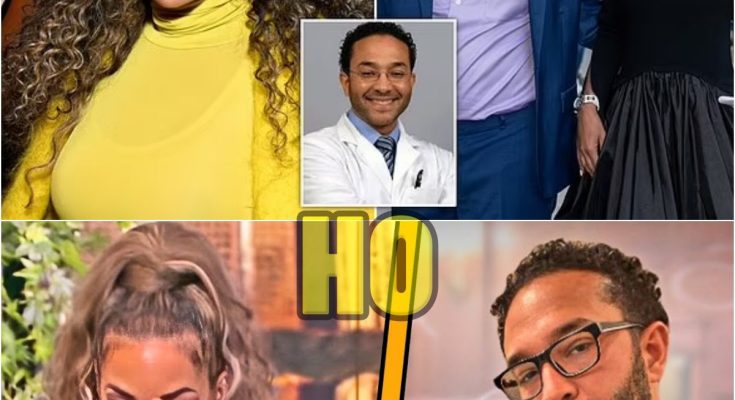In a shocking turn of events, Sunny Hostin’s husband Emmanuel Hostin has been arresteed in a high-profile RICO fraud case.

Sunny Hostin, co-host of ABC’s The View, has long positioned herself as a fearless advocate for justice, transparency, and moral integrity. Known for her strong stance on political corruption, social inequality, and the fight for accountability, Hostin has become a prominent figure in media discussions on ethics.
However, her public image has been thrust into turmoil after her husband, Dr. Emanuel “Manny” Hostin, was implicated in one of the largest RICO (Racketeer Influenced and Corrupt Organizations) lawsuits in New York history.
This $450 million lawsuit accuses Dr. Hostin, an orthopedic surgeon, of engaging in a massive insurance fraud scheme involving kickbacks, unnecessary surgeries, and fraudulent medical billing practices. The case, which names nearly 200 defendants, has sparked an intense legal battle and a storm of public scrutiny.
For Sunny, the scandal surrounding her husband has led to difficult questions about her own credibility, especially given her long history of publicly criticizing others for their ethical failings.
The lawsuit filed in December outlines serious allegations against Dr. Hostin. He is accused of participating in a fraudulent operation where he and other healthcare professionals allegedly performed unnecessary surgeries on patients, many of whom had minor injuries.
The lawsuit claims that Dr. Hostin and his colleagues often bypassed less invasive treatments like physical therapy in favor of costly surgeries, which they then billed insurance companies for, inflating the true costs.
The accusations go even further, suggesting that Dr. Hostin received kickbacks from surgery centers in exchange for patient referrals. This practice allegedly created a financial incentive structure that prioritized profit over patient care.
If true, these practices not only harmed patients by exposing them to unnecessary medical procedures but also contributed to the ever-rising cost of healthcare, as insurance companies were left to pay for unnecessary surgeries, ultimately passing those costs onto the public.
At the heart of the lawsuit is the claim for over $450 million in damages, a sum that underscores the scale of the alleged operation. The case highlights a systemic problem within the healthcare industry, where financial incentives may be influencing medical decisions to the detriment of patient well-being.
The lawsuit’s gravity has led to widespread media coverage and public attention, especially due to the involvement of a high-profile figure like Dr. Hostin.
As the legal drama surrounding her husband unfolded, Sunny Hostin’s public response to the situation has been closely scrutinized. While she has been known to fiercely defend the values of accountability and transparency on The View, her defense of Dr. Hostin in light of the serious allegations has left many questioning whether her moral stance extends to her own family.
In her defense, Sunny has echoed her husband’s legal team’s arguments, claiming that the lawsuit is a baseless attack by a financially troubled insurance company trying to avoid paying out claims.

She has suggested that Dr. Hostin’s actions were not malicious but rather part of an effort to be fairly compensated for his work in an often broken healthcare system. She has also voiced concerns about the systemic issues within the healthcare industry that could contribute to such legal battles.
However, critics argue that her defense of her husband may appear to endorse the very practices the lawsuit is accusing him of. While Sunny has been vocal about holding others accountable, particularly conservative figures and corporate entities, her reaction to her husband’s scandal has raised eyebrows. Some see her defense as inconsistent, especially given her public condemnation of unethical behavior in other high-profile cases.
The public’s reaction to Sunny Hostin’s handling of the situation has led to accusations of hypocrisy. For years, Sunny has used her platform to criticize public figures, corporations, and political systems she believes are corrupt or unethical.
Whether addressing corporate greed or calling out figures like Matt Gaetz or Donald Trump for their alleged moral lapses, Sunny has been quick to hold others accountable. Yet, when it comes to her own family, her response has been notably different.
Many are now questioning whether Sunny’s commitment to justice and accountability is as unwavering as she has portrayed. Does she only apply her principles when it suits her, or is she truly committed to holding everyone to the same standard, even those closest to her? The perceived double standard has led some to wonder if Sunny’s moral posturing is more about political or personal convenience than a genuine commitment to ethical behavior.
The media’s response to the scandal involving Dr. Hostin has been somewhat telling as well. Despite the severity of the allegations, mainstream media outlets have been relatively sparse in their coverage of the lawsuit compared to other high-profile scandals. This has led to accusations of media bias, with some claiming that figures like Sunny Hostin, who are well-connected in the media and political world, receive a level of protection from the same scrutiny that is often applied to their conservative counterparts.
This disparity in media coverage further fuels the perception that public figures, particularly those on the left, are given more leeway and less intense public scrutiny when facing allegations. In contrast, conservative figures often find themselves under relentless media scrutiny, regardless of whether the claims against them are substantiated.
This unequal treatment has only added fuel to the fire surrounding Sunny Hostin’s personal scandal, with some arguing that the media is turning a blind eye to a situation that would have received far more attention if it involved a conservative figure.
Beyond the personal drama surrounding the Hostin family, the lawsuit brings to light larger, more systemic issues within the healthcare and insurance industries. The allegations suggest a widespread culture of fraud, with doctors, surgery centers, and insurance companies all potentially complicit in inflating healthcare costs for personal gain.
If proven true, this case could serve as a stark reminder of the vulnerabilities within the healthcare system, where financial incentives often outweigh patient care.
The fact that these alleged practices may have been widespread adds weight to the argument that this is not just an isolated case but part of a larger, deeply ingrained problem within the healthcare industry. If these allegations are substantiated, they could lead to sweeping reforms in how insurance fraud is handled and may prompt a larger conversation about the role of profit in healthcare decisions.
At the center of this scandal is a family in crisis. Sunny Hostin, once a vocal critic of corruption and injustice, now faces personal questions about her own integrity. Her defense of her husband, despite the serious allegations, has sparked intense debate about the intersection of personal loyalty, public accountability, and moral consistency.
As the legal battle continues, the public’s opinion of both Sunny and her husband hangs in the balance. Whether Dr. Hostin is ultimately found guilty or innocent, this case will undoubtedly leave a lasting impact on the public’s perception of the Hostin family, especially Sunny, whose reputation as a fierce advocate for justice may now be called into question.
The controversy surrounding Sunny Hostin and her husband raises critical questions about the nature of public figures’ moral stances, the media’s role in shaping public perception, and the challenges of navigating personal and public accountability. As the legal drama unfolds, many are left wondering if Sunny Hostin’s calls for justice and transparency can be fully trusted—or if they are simply a convenient narrative to promote when it suits her agenda.



